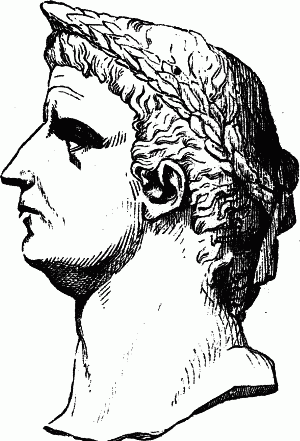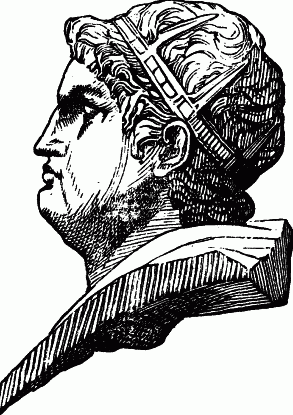
Poor dull Claudius heard an uproar and hid himself, thinking he was going to be murdered like his nephew, but still worse was going to befall him. They were looking for him to make him Emperor, for he was the last of his family. He was clumsy in figure, though his face was good, and he was a kind-hearted man, who made large promises, and tried to do well; but he was slow and timid, and let himself be led by wicked men and women, so that his rule ended no better than that of the former Cæsars.
He began in a spirited way, by sending troops who conquered the southern part of Britain, and making an expedition thither himself. His wife chose to share his triumph, which was not, as usual, a drive in a chariot, but a sitting in armor on their thrones, with the eagles and standards over their heads, and the prisoners led up before them. Among them came the great British chief Caractacus, who is said to have declared that he could not think why those who had such palaces as there were at Rome should want the huts of the Britons.
Claudius was kind to the people in the distant provinces. He gave the Jews a king again, Herod Agrippa, the grandson of the first Herod, who was much loved by them, but died suddenly after a few years at Cæsarea, after the meeting with the Tyrians, when he let them greet him as a god. There were a great many Jews living at Rome, but those from Jerusalem quarrelled with those from Alexandria; and one year, when there was a great scarcity of corn, Claudius banished them all from Rome.

Claudius was very unhappy in his wives. Two he divorced, and then married a third named Messalina, who was given up to all kinds of wickedness which he never guessed at, while she used all manner of arts to keep up her beauty and to deceive him. At last she actually married a young man while Claudius was absent from Rome; but when this came to his knowledge, he had her put to death. His last wife was, however, the worst of all. She was the daughter of the good Germanicus, and bore her mother's name of Agrippina. She had been previously married to Lucius Domitius Ænobarbus, by whom she had a son, whom Claudius adopted when he married her, though he had a child of his own called Britannicus, son to Messalina. Romans had never married their nieces before, but the power of the Emperors was leading them to trample down all law and custom, and it was for the misfortune of Claudius that he did so in this case, for Agrippina's purpose was to put every one out of the way of her own son, who, taking all the Claudian and Julian names in addition to his own, is commonly known as Nero. She married him to Claudius' daughter Octavia, and then, after much tormenting the Emperor, she poisoned him with a dish of mushrooms, and bribed his physician to take care that he did not recover. He died A.D. 54, and, honest and true-hearted as he had been, the Romans were glad to be rid of him, and told mocking stories of him. Indeed, they were very bad in all ways themselves, and many of the ladies were poisoners like Agrippina, so that the city almost deserved the tyrant who came after Claudius. Nero, the son of Agrippina by her first marriage, and Britannicus, the son of Claudius and Messalina, were to reign together; but Nero was the elder, and as soon as his poor young cousin came to manhood, Agrippina had a dose of poison ready for him.
Nero, however, began well. He had been well brought up by Seneca, an excellent student of the Stoic philosophy, who, with Burrhus, the commander of the Prætorian Guard, guided the young Emperor with good advice through the first five years of his reign; and though his wicked mother called herself Augusta, and had equal honors paid her with her son, not much harm was done to the government till Nero fell in love with a wicked woman, Poppæa Sabina, who was a proverb for vanity, and was said to keep five hundred she-asses that she might bathe in their milk to preserve her complexion. Nero wanted to marry this lady, and as his mother befriended his neglected wife Octavia, he ordered that when she went to her favorite villa at Baiæ her galley should be wrecked, and if she was not drowned, she should be stabbed. Octavia was divorced, sent to an island, and put to death there; and after Nero married Poppæa, he quickly grew more violent and savage.
Burrhus died about the same time, and Seneca alone could not restrain the Emperor from his foolish vanity. He would descend into the arena of the great amphitheatre and sing to the lyre his own compositions; and he showed off his charioteering in the circus before the whole assembled city, letting no one go away till the performance was over. It very much shocked the patricians, but the mob were delighted, and he chiefly cared for their praises. He was building a huge palace, called the Golden House because of its splendid decorations; and, needing money, he caused accusations to be got up against all the richer men that he might have their hoards.

A terrible fire broke out in Rome, which raged for six days, and entirely destroyed fourteen quarters of the city. While it was burning, Nero, full of excitement, stood watching it, and sang to his lyre the description of the burning of Troy. A report therefore arose that he had actually caused the fire for the amusement of watching it; and to put this out of men's minds he accused the Christians. The Christian faith had begun to be known in Rome during the last reign, and it was to Nero, as Cæsar, that St. Paul had appealed. He had spent two years in a hired house of his own at Rome, and thus had been in the guard-room of the Prætorians, but he was released after being tried at "Cæsar's judgment-seat," and remained at large until this sudden outburst which caused the first persecution. Then he was taken at Nicopolis, and St. Peter at Rome, and they were thrown into the Mamertine dungeon. Rome counts St. Peter as her first bishop. On the 29th of June, A.D. 66, both suffered; St. Paul, as a Roman citizen, being beheaded with the sword; St. Peter crucified, with his head, by his own desire, downwards. Many others suffered at the same time, some being thrown to the beasts, while others were wrapped in cloths covered with pitch, and slowly burnt to light the games in the Emperor's gardens. At last the people were shocked, and cried out for these horrors to end. And Nero, who cared for the people, turned his hatred and cruelty against men of higher class whose fate they heeded less. So common was it to have a message advising a man to put himself to death rather than be sentenced, that every one had studied easy ways of dying. Nero's old tutor, Seneca, felt his tyranny unbearable, and had joined in a plot for overthrowing him, but it was found out, and Seneca had to die by his own hand. The way he chose, and his wife too for his sake, was to open their veins, get into a warm bath, and bleed to death.
Nero made a journey to Greece, and showed off at Olympus and the Isthmus, at the same time robbing the Greek cities of numbers of their best statues and reliefs to adorn his Golden House; for the Romans had no original art—they could only imitate the Greeks and employ Greek artists. But danger was closing in on Nero. Such an Emperor could be endured no longer, and the generals of the armies in the provinces began to threaten him, they not being smitten dumb and helpless as every one at Rome seemed to be.
The Spanish army, under an officer named Galba, who was seventy-two years old, but to whom Augustus had said when he was a little boy, "You too shall share my taste of empire," began to move homewards to attack the tyrant, and the army from Gaul advanced to join it. Nero went nearly wild with fright, sometimes raging, sometimes tearing his hair and clothes; and the people began to turn against him in anger at a dearth of corn, saying he spent everything on his own pleasures. As Galba came nearer, the nobles and knights hoped for deliverance, and the Prætorian Guard showed that they meant to join their fellow-soldiers, and would not fight for him. The wretched Emperor found himself alone, and vainly called for some one to kill him, for he had not nerve to do it himself. He fled to a villa in the country, and wandered in the woods till he heard that, if he was caught, he would be put to death in the "ancient fashion," which he was told was being fixed with his neck in a forked stick and beaten to death. Then, hearing the hoofs of the horses of his pursuers, he set a sword against his breast and made a slave drive it home, and was groaning his last when the horsemen came up. He was but 30 years old, and was the last Emperor who could trace any connection, even by adoption, with Augustus. He perished A.D. 68.